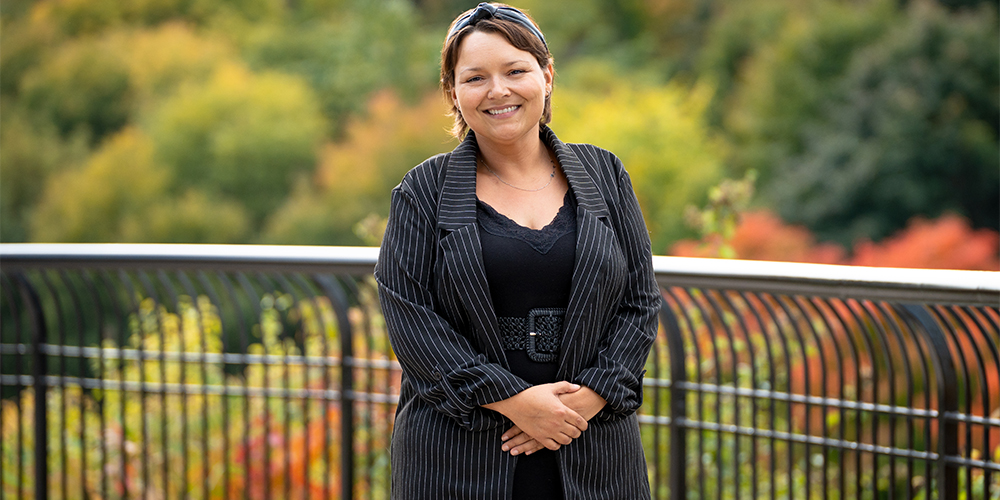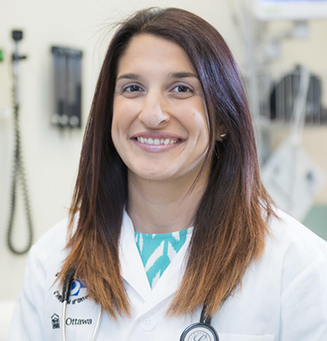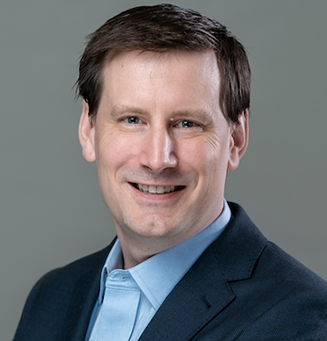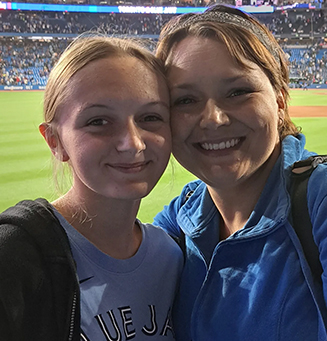A promising treatment for terminal cancer patients may be just the beginning
Researchers in Ottawa and Vancouver are building a made-in-Canada network to treat patients with acute lymphoblastic leukemia and other cancers

At a glance
Issue
While a game-changing cancer treatment known as CAR T-cell therapy is available commercially in Canada, many terminally ill patients do not have access to this potentially life-saving therapy.
Research
In the first clinical trial of “made-in-Canada” CAR-T therapy, 13 of 30 patients had a complete response to treatment, meaning they were cancer-free. Another two patients had partial responses; in five, the cancer was progressing; and nine passed away from their cancer. A Phase II trial is expanding the scope to 100 patients and building a more extensive manufacturing and clinical network across the country. Meanwhile, a brand new trial will test an innovative approach to CAR T-cell therapy that has never been performed in humans.
Impact
Typically, CAR T-cell treatment is limited to a small percentage of leukemia and lymphoma patients. If the Phase II trial is successful, it will expand equitable access to a ground-breaking cancer treatment that could give hope to all terminally ill cancer patients through Canada’s health care system. Meanwhile, a successful trial of the novel approach to CAR T-cell therapy could open the door to other innovative cancer treatments.
Related stories
- A futuristic cure for blood cancer is within our reach, and Dr. Kekre believes Canada should get on board
- A ground-breaking gene therapy to improve health outcomes for patients with acute lymphoblastic leukemia
- The Ottawa Hospital: CAR-T clinical trial provides ‘one last shot’ for leukemia patient
- Clinical Trials at CIHR: Improving people's health
In January 2020, on the day Camille Leahy was to start a new job at a hospital in Newmarket, Ontario, she ended up in its emergency department instead. The cause of her pain: acute lymphoblastic leukemia. For Camille — a 35-year-old single mother who had to withdraw from her job — the diagnosis was the start of a three-year odyssey.
A first round of chemotherapy in Toronto was unsuccessful. After a second round, the cancer went into remission but doctors still recommended a stem cell transplant. Six months after the transplant, just as Camille was starting to walk better and feel normal again, the cancer returned. Her leukemia specialist recommended another round of chemo.
“When I heard him naming those drugs, I broke down,” says Camille. “We were well into the pandemic so I couldn’t have family or friends visiting. I told him, ‘I don’t think I can do it again. And why we are going back to something that didn’t work?’”
By chance, she spoke with another doctor who had earlier mentioned another possible treatment — something to do with CAR T-cells. At the time, she hadn’t paid much attention, convinced the stem cell transplant was the answer. But now, desperate for hope, she brought it up again. It turned out a clinical trial for CAR T-cells was just opening at The Ottawa Hospital.
“They all agreed it was my last shot,” says Camille.
A game-changing treatment for blood cancer
Chimeric Antigen Receptor modified T-cells (CAR-Ts) have become a powerful new tool to treat some forms of blood cancer that don’t respond to standard therapies. In this treatment, a patient’s T-cells are isolated from their blood, re-engineered in a lab to target cancerous B-cells, and then infused back into the patient.
“When I was training in Boston in 2015, we saw this was going to be a game changer,” says Dr. Natasha Kekre, a hematologist and scientist at The Ottawa Hospital and an associate professor at the University of Ottawa. “But we’ve had no publicly funded clinical trials in Canada, and it takes five to ten years to get results from other countries, and then get approval for use in Canada and set up contracts with companies. This is really unfortunate for Canadian patients. I see them firsthand and it’s so difficult to watch.”

With support from colleagues around the country, Dr. Kekre began setting up a network to make CAR T-cells in Canada, called Canadian-Led Immunotherapies in Cancer (CLIC). The initial trial of 60 patients targeted CD19, one of several proteins found on the surface of B-cell cancer. The treatment knocks out all of the body’s B-cells, both healthy and cancerous. But since humans can live without B-cells, it’s an ideal way to fight B-cell cancers like acute lymphoblastic leukemia.
“The novelty in our CD19 trial wasn’t the search for an effective CAR T-cell treatment,” says Dr. Kevin Hay, a hematologist with BC Cancer who is co-leading CLIC with Dr. Kekre. “It was about how we’re building a manufacturing platform in a public health care setting, and making it available to patients, health care professionals and researchers by sharing our results and through collaborations.”
The original US trials required patients who were well enough to survive for four to six weeks — the turnaround time to manufacture and deliver CAR T-cells. Since the CD19 trial only needed a 15-day turnaround, the Canadian researchers made a point of taking the sickest patients — people like Camille Leahy, who had run out of options.
“Often, commercial trials exclude the very sick because — frankly — if they die, it can make your results look worse,” says Dr. Kekre. “Getting Camille into our trial was incredibly difficult because she got sick a few times and I had to keep cancelling. If this had been an industry-sponsored study, even in Canada, she would have lost her spot.”
In their first published study, the researchers reported no detection of cancer in 13 of 30 patients, known as a “complete response”. Another two patients had partial responses; in five, the cancer was progressing; and nine passed away from their cancer.
CAR T-Cells: The Next Generation

“These T-cell therapies have been transformative,” says Dr. Hay. “It’s unheard of to get 30-50 percent survival rates. But on the flip side the disease comes back in 30-70 percent of people, either because they relapse after CD19 treatment or because the CAR T-cells don’t work.”
To continue improving how CAR T-cell therapies benefit cancer patients, Dr. Hay is taking this ground-breaking treatment one step further.
Dr. Hay received CIHR funding to build the next generation of CAR T-cells. In collaboration with the National Research Council (NRC), he is leading a Phase I trial of CD22, another protein associated with B-cell cancer. He hopes the treatment will help patients who did not respond to CD19 treatment or had relapsed. Consequently, this new trial will take on patients who were even sicker than in the original study.
“CD22 will be the first time that we’ve made a novel CAR-T that has never been tested in humans,” says Dr. Kekre. “But it’s only the beginning. The NRC is working on many targets for us, and there are many options for combining CAR-T or other targets. It’s a learning process.”
Building a pan-Canadian CAR T-cell network

Building on initial results, Dr. Kekre received funding under CIHR’s Clinical Trials Fund to support a Phase II trial for CD19 that will treat up to 100 patients. More importantly, the team will set up six clinical sites and four manufacturing sites, allowing them to cover the entire country.
“Ultimately, I would like to see manufacturing everywhere, but Ottawa, Toronto, Winnipeg and Calgary are a good start,” says Dr. Kekre. “They have the right lab resources, the motivation, the desire to collaborate and the patients for the trials.”
Access to clinical sites is hugely important. Camille Leahy, for example, was accepted in the Phase I trial in Ottawa partly because she could stay for a year off and on with a supportive relative living nearby. In fact, her cousin was a registered nurse who actually worked at The Ottawa Hospital. Building a pan-Canadian network can improve equitable access so patients don’t have to jump through so many hoops to get treatment.
The network will also build capacity in Canada’s public health system. “Canadian researchers and immunologists have a lot of brilliant ideas,” says Dr. Hay. “We want to keep this expertise in Canada and foster innovation, which will feed back into our health care system. If all these people are paying taxes here, they are supporting our economy and creating jobs, as well as strengthening health care.”
Still in the game

The researchers’ work has gained a lot of attention. Thanks to Canada’s support and data, for example, Denmark is conducting a similar trial. Meanwhile, a documentary film crew will be interviewing Camille Leahy about her experience.
Camille, now 38, was one of the 13 patients who had no sign of cancer after the CAR T-cell treatment. Free of pain, she is now getting around without a cane or a walker. In fact, in the summer of 2022, she and her teenaged daughter took part in MUDGIRL, a 5-km obstacle course that raises funds for women’s cancer research.
“We’re a year and a half out from the trial, and I feel very lucky and grateful,” says Camille. “There’s always fear, but I try to focus on the here and now. I tell people with cancer not to give up, even if they’re told there’s no hope. Maybe there’s another option out there so they should keep looking.”
Dr. Kekre, Dr. Hay, and a network of researchers will continue working hard to support patients like Camille and help them have access to life-changing cancer treatments in the future.
Canadian-Led Immunotherapies in Cancer (CLIC) supporters, partners and investigators
Canadian Institutes of Health Research, BioCanRx, BC Cancer, BC Cancer Foundation, The Ottawa Hospital Foundation, Ontario Institute for Cancer Research, Ottawa Regional Cancer Foundation, Leukemia and Lymphoma Society of Canada, National Research Council Canada, The Ottawa Hospital’s Biotherapeutics Manufacturing Centre, BC Cancer’s Conconi Family Immunotherapy Lab, the Ottawa Methods Centre, the Blueprint Translational Research Group, Natasha Kekre, Harold Atkins, John Bell, Kevin Hay, Rob Holt, Brad Nelson, John Webb, Julie Nielsen, Manoj Lalu, Kednapa Thavorn, Dean Fergusson, Justin Presseau, Jen Quizi.
- Date modified: